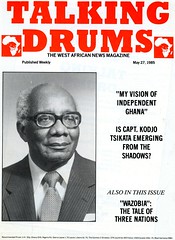Letters
Power to the people
Having seen and read Kodjo Crobsen's book of cartoons and poems, I would like to make a few observations on it against the background of the very interesting review published in the May 20, issue. Without a shadow of doubt, Crobsen has captured the political moods of the country since independence and correctly portrayed the aspirations of the Ghanaian public.In this regard, the book touches almost all aspects of Ghanaian life - the political, economic and even the unflappable bureaucracy. The religious side of Ghanaian life is clearly expressed throughout the book with an all-seeing Angel who grows larger and larger as the quality of life deteriorates.
In spite of the gloomy atmosphere which pervades the book, one fact poignantly emerges that things will not go on as they are forever; that things will change for the better. Freedom and justice, the national motto on the coat of arms, will re- surface in the not-too distant future.
There is one oversight. Farmers of the country did not have anything to say in the book. But considering the fact that this group of Ghanaians have suffered so much under all regimes, whatever they would have had to say would have made the book complete.
All the same, "power to the people" says a lot about Ghana from 1957 to the present time than any history book could do in 144 pages.
Rita Kuma, London
Give organised labour a chance
Is the Special Advisor to the PNDC, the enigmatic Captain Kojo Tsikata, once again extending his tentacles to create confusion and fear within the organised labour? He and chairman Rawlings, masterminded the sacking of the top brass of the Trade Union Movement and then commissioned the Accra Local Union to manage the affairs of the national union.At the same period, the Workers Defence Committees were told at secret meetings to seek confrontations with the local branches of the Trade Unions. It was only determination which held the local branches together in the face of indignities from the WDCs.
Pressure was brought to bear upon ALU by the majority of Ghana's organised labour and other external labour organisations, elections were held, the new officers assumed duties.
Now, probably the new leadership is not in for the inscrutable Captain's whims and fancies. Does the fact that a particular politician was a minister in the overthrown Progress Party Government debar him from contacting the Trade Unions, in a country now ruled by the military for the simple reason that the Progress Party government banned the Unions?
Was there any tangible justification for the banning of the Trade Union Congress by the PNDC? Is there the need for the retired Captain to put shackles now on the activities of the organised labour in Ghana?
Tsikata and Rawlings disorganised the TUC through ALU, they must now get off its back. As for personal ambitions of the leaders, the less said about Captain Tsikata the better. How many organisations and human agencies has he used and created to become the Special Adviser to the PNDC chairman?
Has he no contributions to offer the ethos and valid aspirations of modern trade unionism in Africa? Is he becoming the stalking horse to frustrate the unions and their leaders? Are the multi-nationals and unpatriotic acceptance of economic programmes of IMF/World Bank demanding that the Trade Unions should be kept in check?
Unlike PNDC idle talk about absolute equality the Trade Unions have to pursue the genuine tenets of equality. They have to remember at all times that they have onerous responsibilities to their members who constitute a sizeable proportion of poverty-stricken Ghanaians. The unions have to articulate the interests of the members. Trade Unions have an enormous role to fulfil in African nations' economic recovery and should, therefore, not allow themselves to be muzzled by Captain Tsikata's smears and intimidations. They have a Herculean task before them. Ntim Gyakari, London
Is the PNDC serious?
It is my opinion that the PNDC, like the man Rawlings who heads it, is an idealistic government which caught in the web of its own confused view of what a government for Ghana should be.In the first place, Rawlings has been speaking about participatory democracy since he overthrew the Limann regime, but everybody is now aware that he does not have a clue as to how that can be achieved without bringing complete chaos into the country's administration. The PDC and WDC affray taught him a lesson in politics.
Again, Rawlings has realised that it is easier to be outside a government and criticise than managing it himself, thanks to the ideological struggle going on among the supporters of the regime, the lesson has been brought home to him that no one person has a monopoly of wisdom or knowledge of what is good or bad for the country. The collective will or opinion expressed through the much maligned ballot box inspite of its flaws, has stood the test of time.
Asked recently about his aims for the so-called revolution. Rawlings was reported to have said that "we are in the process of evolving structures and modalities to transform the society so that everyone may live in dignity and social justice." The question is: Limann's government was kicked out after only two years in office after seven long years of military misrule. How long does Rawlings want to be able to "transform the society"?
The whole world has witnessed the aberrations of a government which came in without any plans, and presided over chaos, political murders and deterioration of the standard of living of Ghanaians.
Enough is enough, the PNDC should step down for a democratically elected government.
Jeff Dekowski, Tubingen, West Germany
SEND YOUR VIEWS AND REACTIONS ON ISSUES TO
The Editor,
TALKING DRUMS, 68 Mansfield Road, London NW3 2HU.
